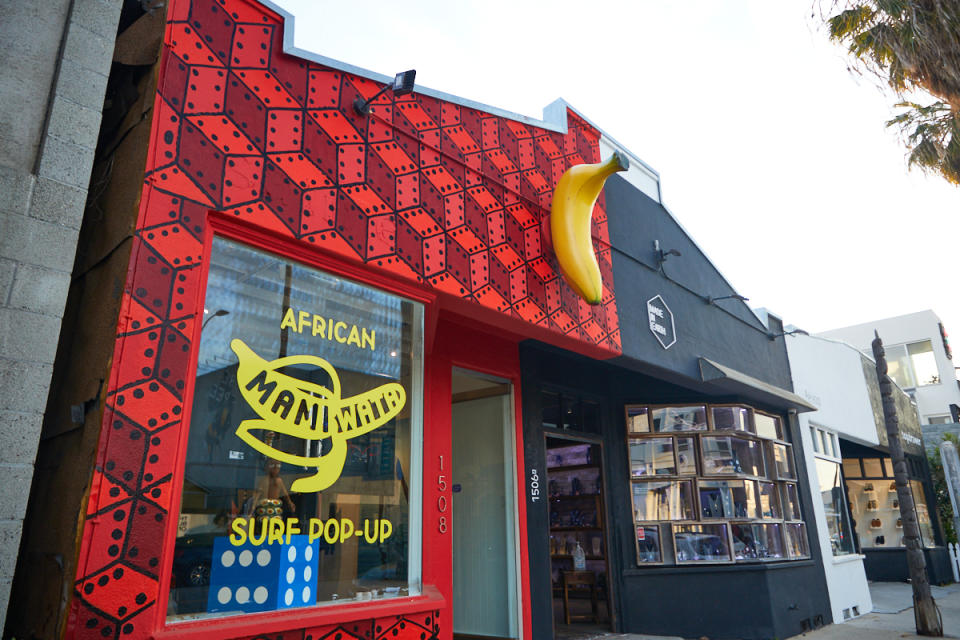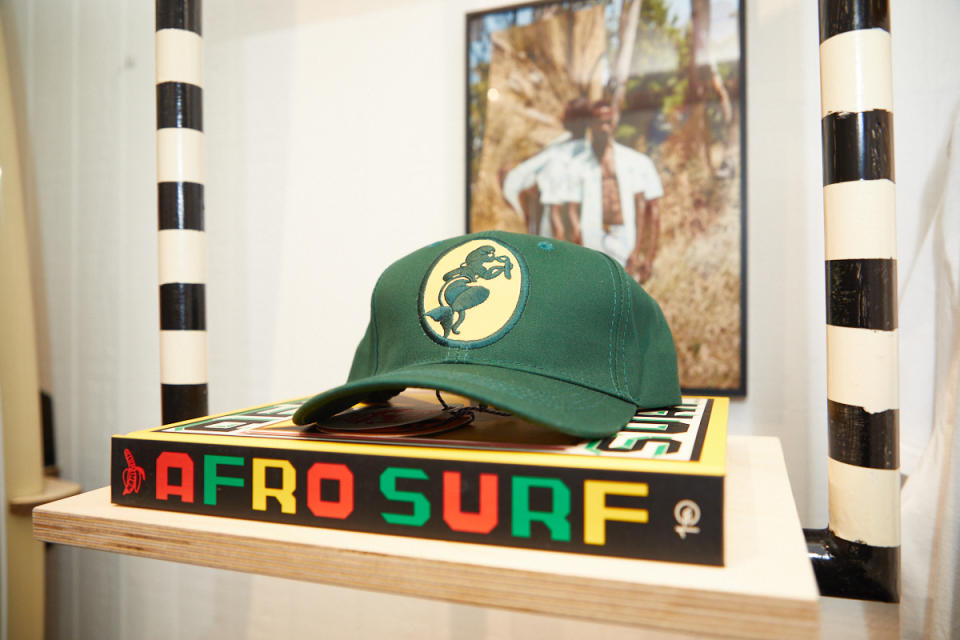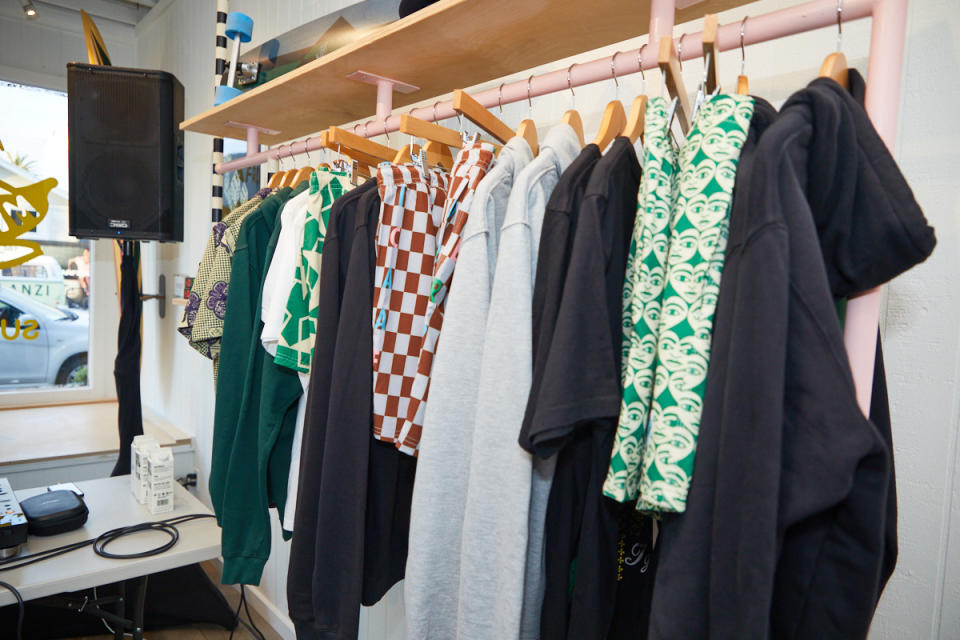South African Brand Mami Wata Brings a More Diverse Vision of Surf Culture to Abbot Kinney
- Oops!Something went wrong.Please try again later.
- Oops!Something went wrong.Please try again later.
- Oops!Something went wrong.Please try again later.

For decades, the image of a surf lifestyle has been one of Southern California’s chief exports, but for too long it’s been tied to an all-white, geographically limited ideal.
South African surf lifestyle brand Mami Wata is out to change that.
More from WWD
“Everyone assumed the surf industry was surf culture, and the best thing brands did was convince us that was the definition,” said L.A. brand cofounder, sports commentator and TV host Selema Masekela, referring to big names in Orange County and Down Under, Billabong and Ripcurl among them. “I see a huge opportunity for that to be smashed.”
This week, Mami Wata opened its first U.S. store in Venice on SoCal’s high-end beach retail row Abbot Kinney, where brands like James Perse and Aviator Nation have outposts nearby.
At the opening party Wednesday night, Lupita Nyong’o, Rita Ora, members of the band LANY and pro surfer Julian Williams were among those who stopped by to lend support, shop and sip South African wine.
“Venice surf culture is not homogenous, all types of folks get down in the water here, so it made sense,” Masekela said during an interview about the location of the pop-up. “And Venice has become a destination for people in SoCal and around the world. I’ve lived here 17 years, and watched Abbot Kinney go from a place for locals to a place where brands have to be to have relevance.
“This pop-up represents a key marketing piece for us, and hopefully it will be shared virally. We are a small company with global goals,” he said.
With a giant banana over the door and a dice-patterned facade, the 1,800-square-foot store is eye-catching, and the joyful clothing inside even more so.
The brand’s mermaid Mami Wata (which means “Mother Ocean” in West African pidgin) logo is splashed on baseball caps and hoodies, while T-shirts are emblazoned with slogans such as “The Ocean Is My Church.”
The spring ’22 “Animism: Luck Is Alive” collection, $50 to $140, includes swim trunks, rash guards, shorts and bowling shirts that have whimsical allover robot dice, motorbike or cartoon face prints. Everything is made in Africa using spun cotton from Zimbabwe and Malawi, among other materials, and visual references from all over the continent.
At the party, guests were snapping photos of the brand’s colorful surfboards, shaped by Hugh Thompson in Jeffrey’s Bay, and Masekela was being asked to autograph Mami Wata’s popular cocktail book, “Afrosurf.”

Courtesy of Greyson Tarantino/Mami Wata
The cofounders produced it themselves during lockdown, turning to Kickstarter for funding, then sparking a bidding war among publishing houses which was ultimately won by Penguin Random House.
More than 15,000 copies of the book featuring profiles of African surfers, essays, photos and illustrations about surf culture have sold, helping to spread Mami Wata’s message and keep its momentum going through COVID-19. All proceeds from the book go to Waves for Change and other African surf therapy organizations, with philanthropy a brand cornerstone.

Courtesy of Greyson Tarantino/Mami Wata
Launched in 2015 in South Africa, the brand opened its first store in Capetown. Masekela joined in 2018, bringing his own African-American perspective informed by years spent on the road with his father, famous trumpeter and South African political activist and exile Hugh Masekela, by growing up in Southern California and being on the surf commentating circuit.
It was when his father was playing on Paul Simon’s “Graceland” tour in Australia that Masekela saw surfing for the first time at Bondi Beach. “To me it was like watching a B Boy, breakdancing on water. I didn’t know how or when, but I knew I had to try it.”
When the family moved to Carlsbad, Calif., in the 1980s, he got a chance.
“I was lucky I moved to a place where surfing was how the community functioned and everything revolved around the ocean, so it wasn’t something people did for novelty or sport, it was lifestyle,” he said.
Not that it was easy. “I went to a school where nobody looked like me…and when I told [a classmate] I wanted to learn to surf, he said, ‘You guys don’t even swim, what do you mean?'”
That lit a fire under Masekela, and he spent 153 days straight on the beach so he could catch up to the other kids. Standing up on the board for the first time is an experience he speaks of in spiritual terms. “This was the first time I felt closeness to God,” he said, explaining how surfing led to his life’s passion and work, founding a couple of brands before Mami Wata, and commentating on the sport on ESPN and NBC around the world.

“I never saw the brands reflect anything that looked like me, and to be a surfer you had to get as close to the idea of the SoCal or South Australian perspective as possible. I was that kid who was trying to lighten my hair to look like these people and be accepted.”
After apartheid started to be dismantled, and he returned with his father to his native South Africa in 1991, Masekela was confronted with racism again, when he was nearly arrested for surfing on what had once been a whites-only beach.
“That trip made me curious about how to expand the landscape, because every time I ran into a Black surfer, and sometimes it would be so intermittently that years would go by, there would always be a moment of recognition that we’d had the same touch points and battles.”
He was introduced through a friend to the three Mami Wata cofounders Nick Dutton, Andy Davis and Peet Pienaar.
“I went to their store in Capetown and was blown away seeing people like me working at a surf shop, and this idea of Afrosurf. I said, ‘What if we can make this global, and redefine what surf culture looks like?’ he said of joining the team as a cofounder based in the U.S.
The brand has been on a steady rise since, starting initially with d-t-c, then going into wholesale with Nordstrom, Saks Fifth Avenue, Selfridges and others.
The brand had an early collaboration with Moncler, which unfortunately came out right as lockdown was beginning in 2020. But Masekela has his eye on other opportunities, including, perhaps in the hospitality space.
“Hello 1 Hotels!” he laughed. “For so long it’s been about SoCal and Australia being the driving force, and this explorer mentality of going to a place, conquering a wave, and then maybe building a surf camp,” he explained about changing the mindset. “Hopefully, what we’re doing is also happening in other regions of world and the idea of surf culture can have more breadth.”

Courtesy of Greyson Tarantino/Mami Wata
There are encouraging signs, he said, name checking Vans’ recent collaboration with Black women’s surfing collective Textured Waves as an example.
“And look at Brazilian surfing, from the late 2000s to now when it has dominated the World Championship Tour,” he said. “Until recently it was common practice to belittle and write off Brazilian culture in surfing as not being a part of surf culture. Their attitude, language barrier, they are not cool. Now you have Ítalo Ferreira as the face of Billabong and Gabriel Medina as the face of Ripcurl. Viewership of the world tour is 80 percent Brazilian.”
Mami Wata is in talks with some African pro surfers about sponsorship, but it is not a brand aspiring to be plastered on the world tour, Masekela explained.
“I’ve commentated it for two decades, but it’s such a small microcosm of what surfing is. For so long, brands have put all their money into 30 individuals. That’s a surf life but not how most people live a surf lifestyle.”
Best of WWD
Sign up for WWD's Newsletter. For the latest news, follow us on Twitter, Facebook, and Instagram.

